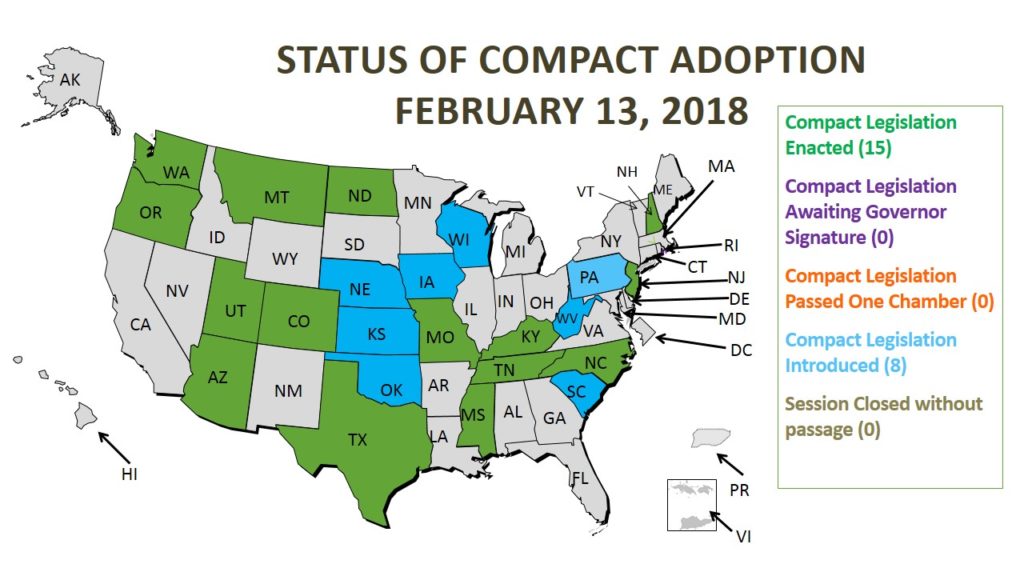A lot has been happening behind the scenes to bring the PT Compact to fruition. We have a lot of good news and things to look forward to in the near future, but also some restrictive rules that travel PTs need to be aware of.
Let’s start with a couple pieces of good news about the compact:

The Compact Commission and Colorado have come to an agreement that officially ends Colorado’s suspension from the compact. Colorado had previously been suspended from the compact because of the state’s “Michael Skolnik Medical Transparency Act” that requires all healthcare workers in Colorado create an online profile. Per the rules of the compact, the requirement for a profile is an additional burden on compact licensees that is not allowed. Other states have similar requirements, but their laws exclude professionals seeking a license through a compact. APTA has worked tirelessly with contacts in the Colorado legislature and with FSBPT to come to an agreement. Legislation has been drafted that if passed would remove the additional requirements for compact PTs and PTAs. Also, the state has assured the commission that it will not seek disciplinary action on individuals participating in the compact in relation to the Medical Transparency Act. Given the efforts made by Colorado, the commission lifted the state’s suspension this past Friday.
The compact was passed into law in the first 15 states last year, and the compact is set to be live in “the first half of 2018” (per PTcompact.org). At the rate most bureaucratic processes move, it is amazing that it is scheduled to take less than one full year from the inception of the compact commission to having actual reciprocity of PT licenses across state lines. To make things even sweeter, 8 other states are currently considering the compact in their legislature, and more states are expected soon. Achieving a compact between over 20 states in less than 2 years would a great feat! I’ve said it before, and I’ll say it again – states that are not in the compact are going to have a hard time filling their staffing needs. Many travel PTs will choose to travel only within the compact states for the increased ease of license transfers. This will greatly shrink the candidate pool in the non-compact states that are still relying on an antiquated, cumbersome license verification process.
…but here’s the catch that every traveler should know about. The current compact rules restrict compact privileges to only those PTs and PTAs with a permanent address in a compact state. To be clear: your tax home has to be in a compact state to participate in the compact, you cannot merely hold a license in a compact state to enjoy the reciprocity. The PT compact came into existence largely because of traveling PTs, and now, the current rules cut out a great number of travelers. The reason for this rule is the commission does not want PTs “license shopping” – meaning, if one state has lower standards, or lower fees, they do not want to flood that state with thousands of travelers who are trying to get in on the compact. Travelers who do not hold a home address in a compact state must continue with the same-old process, even if they are traveling within compact states. I, personally, see a simple solution – grandfather all PTs or PTAs currently holding a license in a compact state – boom, tons more well-vetted travelers admitted to the system with no shopping. But in the meantime, state licensure staff will continue to review hundreds of paper verifications from PTs already holding licenses in compact states, travelers will spend weeks completing the appropriate, pointless paperwork, and the inconveniences that the compact was designed to avoid will largely continue – I digress.
So what can we all do to improve the system and allow more travel PTs into the compact? I wrote a letter to the compact commission prior to their adopting these rules explaining my aggravation and the need to allow more travelers into the system. I have since been in contact at length with APTA staff, Compact Commission Staff, and others. My concerns have definitely been heard, but it would helpful for the compact commission to hear that same concern from others.
There are 2 topics to take action on:
- Travelers need to be working to make non-compact states become compact states. APTA members should be contacting their state chapter to let them know adoption of the compact rules is a legislative priority. Colorado wouldn’t be a compact state if I hadn’t spoken up to make it happen – but once I had mentioned the idea, it was quickly taken up as a priority and set into motion.
- Travelers should be letting their licensure board, APTA representatives, and FSBPT know that the current compact rules that require residency in a compact state harm the efficiency of the compact. The purpose of the compact is to eliminate barriers to licensure between states for well qualified individuals. The current rules restricting compact privileges to permanent residents of compact states fail to optimize the potential of the compact to help travelers and the member states alike.
If you aren’t sure who to contact, your local APTA chapter is a good place to start. But, as the compact is an agreement among states, contacting your state board is an excellent next move after contacting your APTA chapter. The PT compact is moving forward, but it definitely needs the help of the travel PT community to move it in the right direction!



